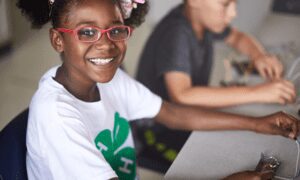David A. Smith grew up as a member of Boys & Girls Clubs, so when he dedicated his career to youth leadership, it made sense that he would find his way back to the organization. After serving as the assistant basketball coach at the University of Missouri in Kansas City and working with YMCA, he is now president of Boys & Girls Clubs of Greater Kansas City. Also, he’s been a mentor to me for many years. I spoke with Dave about the importance of building and maintaining a strong mentorship, and how to apply these insights in career and life.
When you were growing up, who were your mentors?
David Smith (DS): My mother was my biggest mentor. She raised five boys—I was the youngest. I credit her for my work habits and conscientiousness. I would go to her with questions, and she would say, “When you’ve exhausted every other resource you have, I’ll help you.” She was a tough customer! She was certainly my first and biggest influence.
I grew up in BGC where we had role models more than mentors. I think of mentoring as an ongoing situation where you expect regular interaction and discuss specific topics. A role model is someone you see and emulate and aspire to be like. I had several role models in BGC. They were mostly coaches. After college, I was introduced to professional people who mentored me. One was a dean at the University of Missouri here in Kansas City. After I had left the university world, I went to work at the YMCA where I met a guy named Dan Logan who mentored me in resource development and nonprofit management.
Since my time working at Boys & Girls Clubs of Greater Kansas City, you have been an influential mentor to me. What is your approach to mentoring others?
DS: I think my style as a human being is a coaching style. I was the assistant basketball coach at the University of Missouri at Kansas City after I finished my graduate work so that style emerged then. I was responsible for these young student athletes. I did all the recruiting. I was the one who sat at the kitchen table with their mothers, grandmothers, and fathers and committed myself to their well-being. That coaching style continues today in my approach. I just always want to see people reach their potential—whether they see their potential or not.
You have mentored not just me but many others in the youth development sector. How has the experience impacted you professionally?
DS: I think mentoring is a good management tactic, particularly if you’re mentoring people in your organization. The stronger people are around you, the better your product and performance is. It just makes sense to invest in people around you so that they can be the best they can be.
Do you think having a mentor early in a career plays a part in success and growth later on?
DS: I believe that mentors come in different sizes, shapes, colors and packages. Accordingly, mentors appear in various parts of your life and career. In the early parts of your career mentors can influence your structure, foundation and how you behave professionally. As you progress in your career, you need mentors for different things. I’m 65 years old and have spent four decades in the working world, and I’m still mentored by people today. I am mentored by board members, funders or donors who I have a strong relationship with. Just this morning I thought about a benefactor I want to sit down and talk with about some personal things, and I’m pleased that I have those relationships.
We’ve maintained our mentor-mentee connection for many years. What does it take to maintain those kinds of relationships?
DS: First of all, both people have to feel like it’s a good use of their time. And I think you need to understand or agree on expectations regarding how often you meet or how long. Do you have a set schedule or is it as-needed? I’ve been mentoring one young man for what must be 15 years. He was a young professional when we met, and our mentoring relationship has transitioned from sitting down seriously four times a year to maybe doing that once a year. Because he’s got two little babies, and things have changed! But there’s no question that the relationship is solid, and he knows any time he wants to call me, he can count on me to be there.
What advice would you offer to someone who’s mentoring youth?
DS: The key is rapport, but you can’t force rapport or force a relationship. As an adult mentoring youth, you have to be very comfortable with yourself because these kids aren’t necessarily going to show you they’re interested. You have to trust your ability to connect and understand that the connection will get shaky sometimes. You have to develop trust.
How would you advise someone to look for mentors?
DS: There are effective ways at each stage of your life. As a young person, you can look to school personnel or get involved in organizations like 4‑H or Boys & Girls Clubs.
As an older professional, you’re better at identifying resources. You can take note of people who you think would be good mentors, and you approach them and talk to them about it. Or you ask someone to help you identify a mentor. Someone told me once that you should have some mentors that don’t look like you. It gives you a different perspective or framework from which to work. It challenges you and broadens your learning.
Why do you think having a mentor, at any stage of your career, is beneficial?
DS: It must have been 20 years ago that I stumbled upon the realization that I didn’t have to have all the answers. What a glorious discovery that was! The weight of the world was lifted off my shoulders just realizing you can ask others for guidance instead of struggling on your own. The people around us have abundant resources that they’re often willing to share with you if they see that you will value the time and energy they put into it. It just makes sense to tap into those and learn from it.
If you’re able to share ideas and get feedback from someone you trust, it helps you reflect on your situation and come up with your answers. It’s one of the most valuable resources we have as individuals.
















